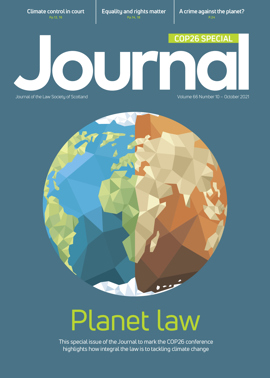Planning: COVID and NPFD update
This article provides an update on important changes in planning law and policy, particularly in regard to the steps taken by Scottish Government to ensure that the planning system can operate efficiently during the COVID-19 pandemic.
COVID-19 modifications
The Town and Country Planning (Miscellaneous Temporary Modifications) (Coronavirus) (Scotland) Regulations 2021 (SSI 2021/292) (“2021 Regulations”) came into force on 29 September 2021. They are made under the Planning Act 1997, the Listed Buildings Act 1997 and both COVID Acts 2020.
The regulations make important adjustments to the COVID temporary modifications to the planning legislation. These are as follows:
Extension of permissions and consents
The 2021 Regulations extend the duration of planning permission, planning permission in principle, listed building consent and conservation area consent by ensuring that, if the permission or consents would otherwise expire during the new “emergency period” (that is now extended until 31 March 2022), then provided development is lawfully commenced on or before 30 September 2022, the permission or consent will not expire. Under the earlier arrangements the emergency period was until 30 September 2021 and the date for lawful commencement was on or before 31 March 2022. The policy objective of this extended duration is stated to be to support the construction sector in its recovery from the COVID restrictions and to ease the burden on planning authorities who would otherwise need to consider new applications.
Pre-application consultation (“PAC”)
PAC applies to applications for “major” and “national” development and requires that prior to making an application the prospective applicant must undertake a minimum amount of public consultation, characterised by the holding of at least one public event. The Town and Country Planning Regulations 2020 suspended the requirement to hold a public event and the Development Management Regulations 2013 were amended to allow consultation by electronic means (e.g. online). The 2021 Regulations retain the suspension of public events until 31 March 2022.
An important aspect of PAC is that it is to be amended by the Town and Country Planning (Pre-Application Consultation) (Scotland) Amendment Regulations 2021 (SSI 2021/99). These regulations increase to two the number of public events that must be held; introduce publicity by electronic means; require additional specification in PAC reports; and provide exemptions where a proposal is for essentially the same development as covered by an earlier application. Section 18(3) of the Planning (Scotland) Act 2019 also specifies that an application must be made within 18 months from serving a proposal of application notice on a planning authority. The 2021 Regulations postpone the coming into force of these changes to PAC from 1 October 2021 to 1 April 2022.
The policy objective of temporarily excluding public events for PAC is due to uncertainties regarding COVID, its infection rates and other variants which may cause reversals in the emergence from lockdowns.
Local review bodies (“LRB”)
Planning applications for “local” development are delegated to an officer of the planning authority. Where such an application is refused, granted subject to unacceptable conditions, or a decision is not taken within the statutory period, the applicant has the right to appeal to an LRB made up of no less than three members of the planning authority. Under the LRB Regulations 2013 the local review must be held in public. The 2021 Regulations operate to terminate the ability of LRBs to meet online on 30 September 2021. From 1 October LRBs must meet in public.
National Planning Framework 4
NPF4 is published by the Scottish Government and must be approved by the Parliament following consultation. It is a spatial plan to 2050, stated to be a “long-term plan for Scotland that sets out where development and infrastructure is needed to support sustainable and inclusive growth”.
The NPF4 Position Statement was published in November 2020. Currently it is intended that the draft NPF 4 will be published in autumn 2021, which may coincide with the COP26 Climate Change Conference in Glasgow from 31 October-12 November.
NPF4 will be a very different policy document from NPF3 that it replaces, as it will be part of the statutory “development plan” to which all planning authorities and the Scottish ministers must have regard in their planning decision-making. There is a rebuttable legal presumption in favour of applications that are in accordance with the provisions of a development plan, and conversely a presumption against those which are not.
NPF4 will also contain for the first time ministers’ policies and proposals for the development and use of land, and targets for the use of land for housing. Unlike NPF3, which sat at the top of the hierarchy of planning policy but was rarely engaged in local planning decision-making, it is expected that NPF4 will be engaged much more frequently. The direction of travel for national planning policy is clear from the Position Statement, which signals a key shift towards a net zero agenda and sets out Scottish Government thinking over four key themes – net zero emissions, resilient communities, wellbeing economy, and better, greener places.
Regulars
Perspectives
Features
Briefings
- Criminal court: ID from CCTV
- Criminal court: Justiciary Office briefing
- Licensing: Passport to confusion
- Planning: COVID and NPFD update
- Insolvency: Winding up easier, but hurdles remain
- Tax: Government continues to bring in new taxes
- Immigration: Asylum from the Taliban?
- OPG: Update
- Property: Common parts – a welcome clarification
- In-house: Lawyer with natural energy






